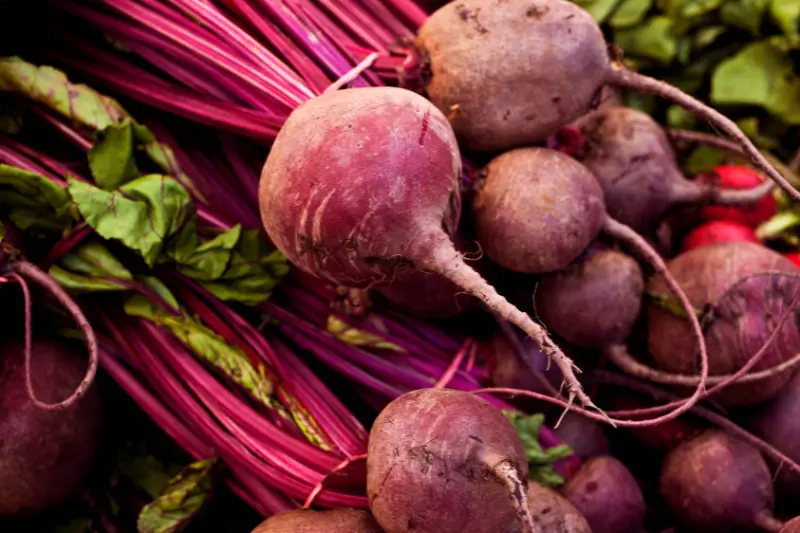It grows in domestic climes, so it’s cheaper in the fall and winter, and it makes a great addition to salads or oven dishes. We reveal why beet is so important for your diet and health
Beet not only contains important nutrients such as vitamin B, iron, magnesium, and potassium but is also a major supplier of nutrients that are only found in a few foods. Ref.
What special nutrients beet provides and how the vegetable affects our body are explained here:
No 1. BEET LOWERS BLOOD PRESSURE
Beets are rich in nitrates. These are converted in the body into nitric oxide, which relaxes and dilates blood vessels so that oxygen and nutrients can be transported more easily. The improved blood circulation lowers blood pressure. Just one glass of beet juice a day can lower blood pressure, this study proves. Ref.
No 2. BEET REDUCES THE RISK OF HEART DISEASE
Beet contains a lot of betaine as well as the B vitamin folate, which together lower the cholesterol level in the blood. Therefore, the effect of the tuber can prevent arterial diseases and heart diseases. Ref.
No 3. BEET PROMOTES ENDURANCE
Professional athletes swear by beets. Why? The nitrates it contains are absolute power boosters that promote endurance. Studies with athletes confirm this positive effect. You need three to five beet tubers (e.g., as juice) before the sports unit can perform significantly better. By the way, the nitrate level is highest two to three hours after ingestion.
No 4. BEET IMPROVES BRAIN FUNCTION
Nitric oxide relaxes and dilates blood vessels, and that includes the brain. This is especially important as we age, since our capacity to produce nitric oxide on our own decreases. In the same way, brain metabolism and nerve activity also decline. This is where the beet acts as an engine for the brain. The results of a 2010 study showed that people who ate a two-day nitrate-heavy diet were better able to concentrate, organize, and work in greater detail than those who ate few nitrates.
No 5. Beetroot SUPPORTS LIVER FUNCtIONS
Eating beet daily can help reduce the accumulation of fat in the liver. This is due to betaine, which, by the way, is otherwise only found in spinach and quinoa. Thus, the tuber not only promotes liver functions, it reduces cholesterol, and also reduces liver size.
No 6. RED BEETS HELP WITH CHRONIC DISEASES
Beet is rich in betalains, a class of antioxidants, as well as other anti-inflammatories that, according to science, fight free radicals and alleviate inflammatory and chronic diseases.
No 7. RED BEET IS GOOD FOR Digestion
To improve the digestive process, it helps to eat foods high in fiber, like beets. A cup of beet juice a day helps reduce the risk of constipation, hemorrhoids, and diverticulitis. The betaine it contains also has a positive effect on digestion, scientists say. The beetroot also makes an ideal addition to a salad.
Nutritional Value
| Ingredient | Crowd | Unit |
| Bread units | 0.6 | BE |
| Kilocalories | 39 | kcal |
| kilojoules | 163 | kj |
| protein | 0.84 | G |
| Fat | 0.18 | G |
| carbohydrates | 6.80 | G |
| Water | 88.00 | G |
| cholesterol | 0.00 | mg |
| alcohol | 0.00 | G |
| Total fiber | 3.06 | G |
| minerals | 0.86 | G |
| Vitamin E active | 0.44 | mg |
DO NOT PEEL BEET IMMEDIATELY
If you want to fully enjoy the superfood beet, then you should not peel it before cooking. The skin ensures that it does not lose its nutrients. After cooking, simply peel off the skin with a knife or your hands – preferably wearing kitchen gloves.
